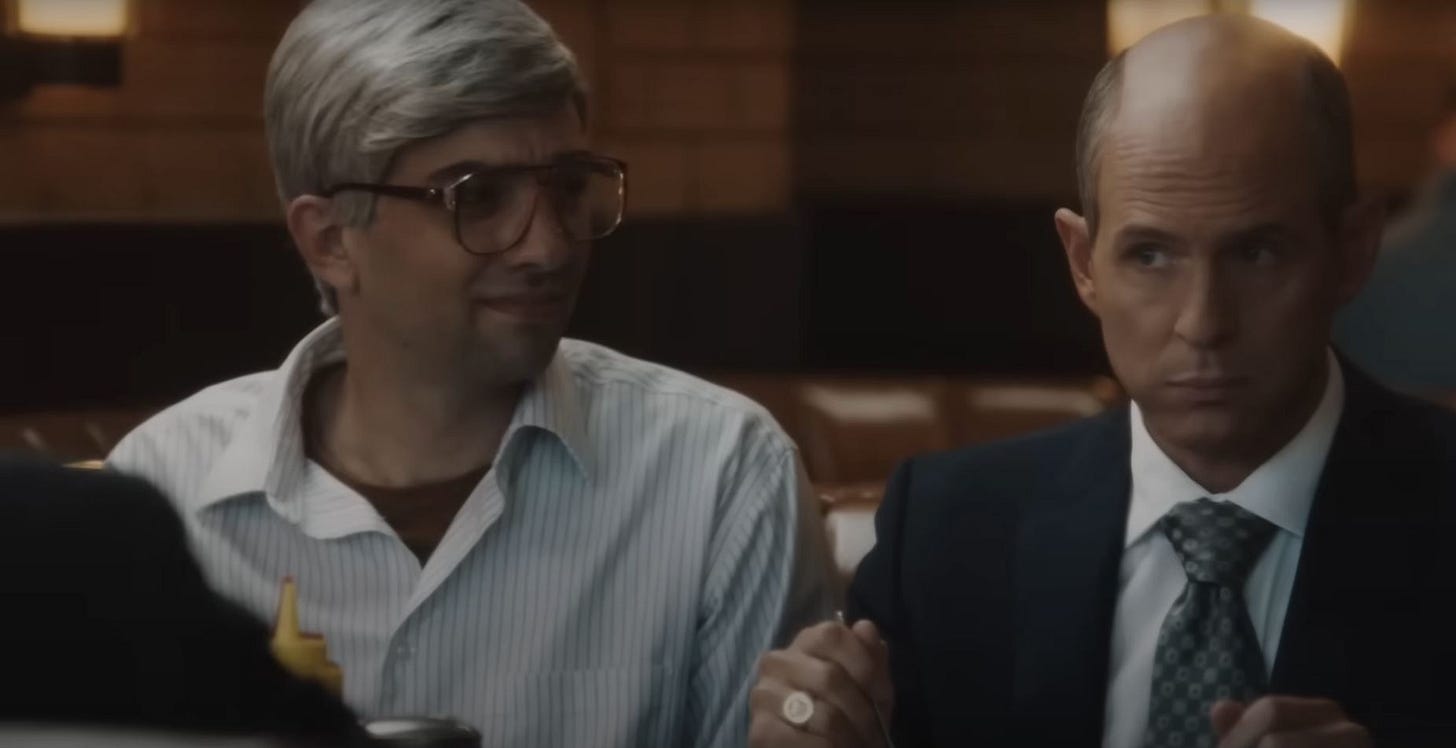‘BlackBerry’ Review
The darker side of the brand movie.
THE RISE OF THE BRAND MOVIE—pictures like Air (about Air Jordans) and Tetris (about Tetris) or the forthcoming Flamin’ Hot (about Flamin’ Hot Cheetos)—represents an odd little moment in motion picture history.
I think this mini-trend has at least something to do with the complete and utter artistic destruction of the musical biopic by Walk Hard: The Dewey Cox Story, a parody that has essentially made the movies it is parodying—flicks like Walk the Line and Bohemian Rhapsody and Rocketman—impossible to take seriously by so succinctly and accurately depicting their formulaic nature. Brand movies are just biopics for products; maybe we can call them produpics.
But the produpic, at least in its current incarnation, tends to differ from the biopic in a fairly significant way. Whereas the rock-solid formula of the musical biopic so capably parodied by Walk Hard demands a fairly straightforward four-act structure—rise, excess, fall, success; rinse, insert new subject, repeat—the produpic isn’t that interested in the fall. The produpic would prefer there not be a fall. These are success stories, odes to capitalism; two cheers will not suffice. Tetris is about guys trying to play by the rules and make a little money in the process, thus almost accidentally changing the world. Air is about redistributing equity from corporations to individuals in a way that can allow the filmmakers to unironically close the movie with a title card informing us, out of nowhere, that Phil Knight (Ben Affleck) has donated $2 billion to charity.1
At root, the biopic is about the danger of genius and the risk of wasting it on drugs or money or women or fame; the only lesson to be learned in the produpic is that if you play fair and believe in your product, everyone benefits.
And there’s an extent to which that’s true about BlackBerry as well, at least in the sense that it’s the story of businessmen who betrayed their principles and tried to circumvent the rules. For their hubris, they were annihilated; BlackBerry still exists, I guess, but it no longer controls two-thirds of the smartphone market.
Mike Lazaridis (Jay Baruchel) was a techie with a dream: he wanted to make a combination phone and email device, with a keyboard, that didn’t crash cell phone networks by overloading them with data. Mike and Douglas Fregin (Matt Johnson, who also directed and cowrote the movie with Matthew Miller), his partner at Canada’s Research in Motion, pitch their terribly named device to Jim Balsillie (Glenn Howerton), who first dismisses them and then buys into the company after he gets fired for being a glory-hogging jerk at work.
What Jim sees that Mike and Doug cannot is that making the device is only half the battle: you need to be able to get a meeting with executives and sell them on what you’ve made. As in Tetris and Air, making a thing is important and good but it means nothing if you can’t clear the rights to that thing or you don’t have the right pitchman to sell that thing. Even if Jim doesn’t understand the technical side of how the phones work—and there’s a very funny scene in BlackBerry where a Verizon executive laughs at his belabored explanation of the technology, telling Jim he got taken for a ride by Mike, before Mike blows the Verizon board’s minds—he does understand how to get people to do what he wants and how to skirt the law in order to hire the team needed to make it all work.
Again, this has all the makings of a fairly standard produpic: it’s about the multifaceted nature of capitalism, the way form and function combine with business know-how to change the world. Except, of course, that BlackBerry failed in rather spectacular fashion, losing its place in the market to Apple and the iPhone in part because BlackBerry was unable to foresee markets for smartphones beyond lawyers and businessmen. But mostly because Mike betrayed a core principle, a tightly held belief.
As the movie opens, we see Mike open up and fix an intercom that’s emitting a low buzz; on the bottom of the offending tech is a stamp that declares it made in China. Everything is made in China to save a few cents and none of it is perfect. “Good enough is the enemy of humanity,” Mike says at one point, and by the time he has transitioned fully from t-shirt-wearing nerd to the besuited, grey-haired wolf on top of the world, you just know that the final thing that breaks the company will involve production in the Middle Kingdom. Sure enough …
BlackBerry is wickedly, quietly funny—this is a chuckle-ha-ha movie, not a gut-busting guffaw feature—and that’s in large part thanks to Glenn Howerton’s work as Jim Balsillie. Howerton is best known for playing well-off sociopath Dennis Reynolds on the long-running FX sitcom It’s Always Sunny in Philadelphia, and his whole career has been building toward this performance. He just has a perfect way of twitching his eyes and tensing his mouth and cocking his head to convey both intense frustration and unearned confidence. It’s Oscar-worthy work.
The produpic and the biopic reach an unholy synthesis in Jobs (2013) and Steve Jobs (2015), the movies that dared to ask what if a man were himself a brand. As a society, we may have to revisit these at some point in the near future to truly understand exactly how we got here.




